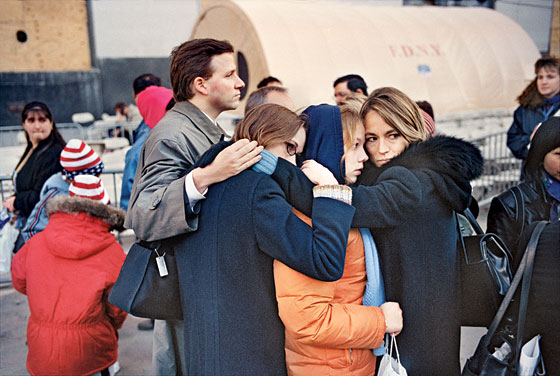 |
A family gathers at a memorial service at ground zero on Sunday, October 28, 2001.
(Photo: Gus Powell) |
More than 1,600 people lost spouses or partners in the attacks; 3,000 children lost parents. There were also parents who lost children, and hundreds more who lost siblings (or cousins, nephews, nieces, in-laws, grandparents, best friends). You don’t choose your family, they say, your family chooses you, and initially the 9/11 families depended on one another for everything. Then anger and frustration propelled some into public life, turning them into activists and sometime political opponents. Now, in their maturity, the “family members,” as they’re still called, regard their affiliation with irritation, fondness, and a loyalty impossible to simulate anywhere outside a foxhole.
At first, no one knew anything. You couldn’t get a death certificate, because your relative was classified as “missing,” so you couldn’t file for life insurance or workers’ compensation. Your personal tragedy was a national catastrophe, but the newspapers failed to provide this kind of information. “We all had questions, and it was family members who could answer them,” said Carie Lemack, whose mother, Judy Larocque, was on Flight 11. Families of September 11, the organization she co-founded, started as a Yahoo listserv. After meeting with the mayor, John Cartier, who’d lost his brother James, collected family members’ names on index cards. Give Your Voice, the group he and his siblings started, became the place to go for information on how to recover human remains. Marian Fontana, whose husband, Dave, had been a Brooklyn firefighter, started the 9-11 Families Association to share information with other firefighter families.
Before long, grief and grievances spurred some family members to fight for causes. Monica Iken founded September’s Mission in October 2001 to ensure that those who died—including her husband, Michael—would be memorialized with respect. Sally Regenhard, the mother of a rookie firefighter who had died, established the Skyscraper Safety Campaign. In memory of his wife, Katherine, Charles Wolf badgered Kenneth Feinberg, the administrator of the September 11th Victim Compensation Fund, until 97 percent of the families received some kind of payout. Four widows dubbed the Jersey Girls helped pressure Congress to create the 9/11 Commission.
There were always fissures, especially between the “uniforms” and the “civilians.” But by the fifth anniversary, the fractures began to grow. Reparations had been made, body parts buried—the world was moving on. Grant money for families groups dried up. Some, like Regenhard, continued to fight the city, real-estate developers, and museum organizers, insisting that none of their efforts sufficiently recognized the magnitude of her loss; others, like Mary Fetchet (co-founder of Voices of September 11th) aligned herself with the developers of the incipient museum, thus becoming a professional 9/11 family member. “Mary Fetchet and them have made a career out of 9/11, making money,” said Jim Riches, a retired fire chief who lost his son Jimmy. “To me, that’s blood money, and I wouldn’t want it.” Fetchet said she runs Voices out of personal passion and a broad need. (As for turning a profit: “Oh my gosh, I don’t think so. That’s absurd.”)
Now the most visible family groups, like 9/11 Families for a Secure America Foundation, are those that froth against immigration reform and the so-called ground-zero mosque. Invisible but working earnestly to fight terrorism and alleviate its traumatic effects: MyGoodDeed; Beyond the 11th; Peaceful Tomorrows; the Peter C. Alderman Foundation, and the Global Survivors Network. For most, the label “family member” is indelible but no longer urgent. “Give Your Voice is pretty much a memory now,” says Cartier. Last year, Donald Goodrich, whose son Peter was on Flight 175, lost his wife, Sally. Several weeks ago, when he was cleaning out his wallet, he found his family-member I.D., required for special access to the sites where his family’s greatest calamity occurred. “I held it in my hand. Do I do this? Do I not do this?” He pauses. “And I let it fall into the wastebasket.” Goodrich would not say he’s moved on, only that he no longer needs a reminder of the family he was forced to join.
From the archives
• The Girl in the 9/11 Bubble (New York Magazine, September 10, 2007)
• The Grief Police (New York Magazine, November 20, 2005)
• The Memorial Warriors (New York Magazine, September 15, 2002)
• The Lives Left Behind (New York Magazine, September 15, 2002)
• The Kids They Left Behind (New York Magazine, October 29, 2001)
• The Circles of Loss (New York Magazine, October 1, 2001)
